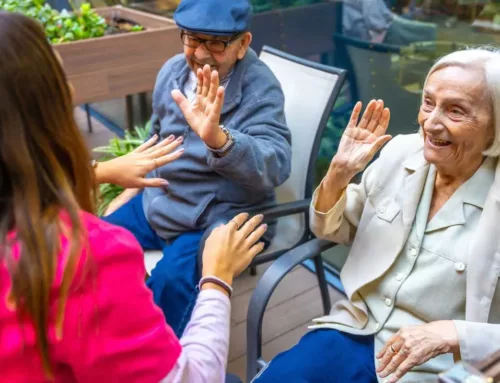
Throughout our lifespan, change is inevitable – and sometimes a little uncomfortable. For aging seniors, the transition from living independently at home to residential assisted living in Tucson can be particularly daunting. During the ‘settling in’ period, it’s not uncommon for seniors to experience feelings of homesickness or anxiety. Luckily, there are a few simple things family caregivers can do to make that transition a little easier. Let’s take a look at just a few tried-and-tested ways to help an aging loved one adjust to senior care.
Prioritize the Personal Touches
In the initial weeks and months after moving to residential assisted living, it can be difficult for aging seniors to feel completely ‘at home’. If your parent or loved one lived in the same place for many years before moving to senior care, making their new space feel like home might be particularly tough. One of the best things you can do during this period is to help your loved one personalize their space, truly making it into their own. Regardless of how small or large their room or apartment is, there are always things you can do to make it feel that bit more like home. Depending on the senior care facility in Tucson, your loved one might have space to add some of their favorite small items of furniture, for example, and most rooms will have somewhere to hang familiar pieces of artwork or beloved family photographs.
Arrange Regular Visits and Stay Reachable
It’s common for aging seniors to worry about being abandoned or losing touch with their family after they move to residential assisted living. Help alleviate these worries by making sure to visit and call your loved one frequently. While regular visits can be a great way to help your loved one feel supported, it’s important to be smart about those visits, too. For example, if your loved one is struggling to make friends independently, you may wish to offer encouragement by exploring community activities together. Or if they often get emotional when you have to leave, make sure they are with company and engaged in an enjoyable activity when the time comes.
It’s also worth noting that for some aging seniors, it can be more beneficial to limit visits in the initial few months – perhaps to once every week or two. If you’ve noticed your loved one is not leaving their room and is waiting for your visits to socialize, slightly less frequent visits may encourage them to push out of their comfort zone and explore the community independently. Each individual is unique; for some aging seniors, regular visits might help them feel more settled and alleviate fears of abandonment, whereas others may need some time to find their feet on their own. If you’re unsure about the best approach for your loved one, speaking to their residential assisted living caregivers may help you gain an insight into how they’re getting on and how they react to your visits.
Liaise With Professional Caregivers
Continuing from the previous point, senior care professionals are your greatest ally in your loved one’s transition from independent living to senior care! Having helped countless seniors settle into the community and adapt to a new way of living, their inside knowledge is invaluable. Professional and family caregivers are partners, so don’t be afraid to keep the lines of communication open to tailor your loved one’s care. As their child or close relative, you know them best, and you can be a valuable asset in their care plan development. Does your loved one enjoy an outdoor morning coffee at a particular time each day? What is their preferred bedtime routine? What are their favorite foods, drinks, and activities? Don’t be afraid to let us know so we can help your loved one feel at home even when you’re not around.
Help Them Meet new Friends and Neighbors
Meeting and forming friendships with fellow residents and staff members are hands-down one of the best ways to help a senior settle into their new home. Spending time with new friends can help ease feelings of loneliness and avert boredom, and as a family caregiver, you can play a vital role in helping your loved one make new acquaintances. Why not join an activity or class together on one of your visits, or take some time to explore the facilities? Promoting independence is great, but sometimes a little moral support may be all your parent needs to take action and get involved in their new community.
Offer a Listening ear
Above all else, simply be there for them. Though the decision to move to residential assisted living will be greatly beneficial to your loved one’s future health and happiness, this doesn’t mean it won’t be a little difficult in the beginning. For a large proportion of aging seniors, a move to senior care will be the most major change they have experienced in many years. Even if they are excited about a new beginning and fresh opportunities, they’re likely apprehensive, too. As their family caregiver, your support through the journey will mean the world to them. Think about all the reasons you decided to seek out residential assisted living together. When they feel down or deflated, gently remind them of these, without dismissing their emotions, worries or concerns.
To find out more about how Saguaro Ranch supports aging seniors as they adapt to residential assisted living, get in touch or arrange a visit today.




